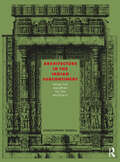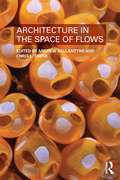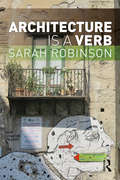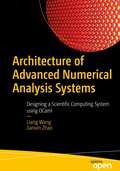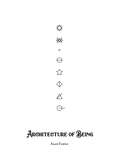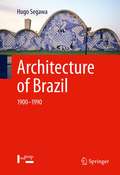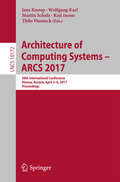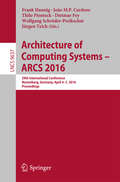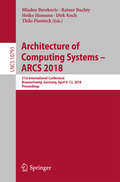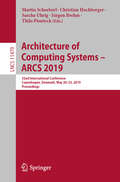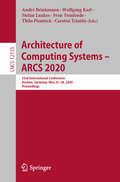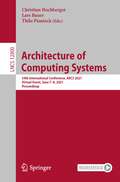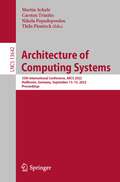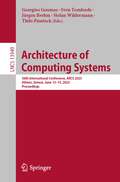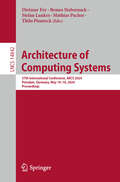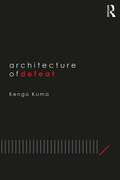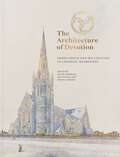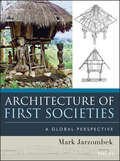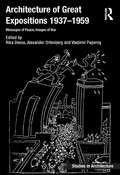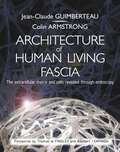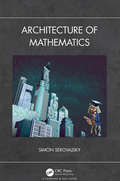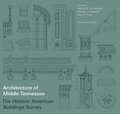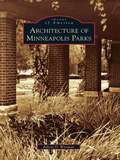- Table View
- List View
Architecture in the Indian Subcontinent: From the Mauryas to the Mughals
by Christopher TadgellDedicated to the tracing of continuity across sectarian divides, Christopher Tadgell’s History of Architecture in India (1989) was the first modern monograph to draw together in one volume all the strands of India’s pre-colonial architectural history – from the Vedic and Native traditions of early India, through Hindu, Buddhist, Islamic and secular architecture. This comprehensive revision, Architecture in the Indian Subcontinent: From the Mauryas to the Mughals, expands the structure to acknowledge the great advance in scholarship across this extremely complex subject over the last three decades. An understanding of Indian history and religion is the basis for understanding the complex pattern of relationships in the evolution of architecture in the subcontinent. Therefore, background material covers major invasions, migrations, dynastic conflicts and cultural and commercial connections, the main religious developments and their significance and repercussions, and external architectural precedents. While avoiding the usual division of the subject into ‘Buddhist and Hindu’ and ‘Islamic’ parts in order to trace continuity, the importance of religion, symbolism and myth to the development of characteristic Indian architectural forms in all their richness and complexity is fully explained in this fully illustrated account of the subcontinent’s architecture.
Architecture in the Space of Flows
by Chris L. Smith Andrew BallantyneTraditionally, architecture has been preoccupied with the resolution of form. That concern helps to make photogenic buildings, which have received a great deal of attention. This book looks instead at the idea of the flows, which connects things together and moves between things. It is more difficult to discuss, but more necessary, because it is what makes things work. Architects have to think about flow – the flow of people through buildings, the flow of energy into buildings, and waste out of them – but usually the effects of flow do not find expression. The essays gathered here present a collection of exploratory ideas and offer an understanding of buildings, people and settlements through concepts of flow.
Architecture is a Verb
by Sarah RobinsonArchitecture is a Verb outlines an approach that shifts the fundamental premises of architectural design and practice in several important ways. First, it acknowledges the centrality of the human organism as an active participant interdependent in its environment. Second, it understands human action in terms of radical embodiment—grounding the range of human activities traditionally attributed to mind and cognition: imagining, thinking, remembering—in the body. Third, it asks what a building does—that is, extends the performative functional interpretation of design to interrogate how buildings move and in turn move us, how they shape thought and action. Finally, it is committed to articulating concrete situations by developing a taxonomy of human/building interactions. Written in engaging prose for students of architecture, interiors and urban design, as well as practicing professionals, Sarah Robinson offers richly illustrated practical examples for a new generation of designers.
Architecture of Advanced Numerical Analysis Systems: Designing a Scientific Computing System using OCaml
by Liang Wang Jianxin ZhaoThis unique open access book applies the functional OCaml programming language to numerical or computational weighted data science, engineering, and scientific applications. This book is based on the authors' first-hand experience building and maintaining Owl, an OCaml-based numerical computing library. You'll first learn the various components in a modern numerical computation library. Then, you will learn how these components are designed and built up and how to optimize their performance. After reading and using this book, you'll have the knowledge required to design and build real-world complex systems that effectively leverage the advantages of the OCaml functional programming language. What You Will LearnOptimize core operations based on N-dimensional arraysDesign and implement an industry-level algorithmic differentiation moduleImplement mathematical optimization, regression, and deep neural network functionalities based on algorithmic differentiationDesign and optimize a computation graph module, and understand the benefits it brings to the numerical computing libraryAccommodate the growing number of hardware accelerators (e.g. GPU, TPU) and execution backends (e.g. web browser, unikernel) of numerical computationUse the Zoo system for efficient scripting, code sharing, service deployment, and compositionDesign and implement a distributed computing engine to work with a numerical computing library, providing convenient APIs and high performance Who This Book Is For Those with prior programming experience, especially with the OCaml programming language, or with scientific computing experience who may be new to OCaml. Most importantly, it is for those who are eager to understand not only how to use something, but also how it is built up.
Architecture of Being
by Alan FaenaAuthored during the height of the pandemic amidst a period of self-reflection, culture and style impresario Alan Faena conceives a deeply personal framework of attributes to liberate the self in this highly personal manifesto exploring the constructs of human potential.To build my dreams, I first had to build myself. In this book I share the secrets of that Architecture. — Alan Faena As a creative with a highly personal vision of design, Alan Faena has produced some of the most extraordinary spaces in the recent past — from his ingenious reconstruction of an abandoned neighborhood in Buenos Aires to the heights of luxury in Miami Beach. Faena now presents the guiding principles that have helped him produce these urban marvels. Authored during the height of the pandemic, Faena conceived a deeply personal framework of tenets that guided his journey of self-discovery and creativity. Composed of eight thematic pillars — Creation, Vision, Weakness, Silence, Path, Present, Love and Architecture — these chapters explore the inspired source from which all creativity emanates, from the personal battles to the deliberate decisions that ultimately define Faena&’s vision and infuse his imaginative vision.
Architecture of Brazil: 1900-1990
by Hugo SegawaArchitecture of Brazil: 1900-1990 examines the processes that underpin modern Brazilian architecture under various influences and characterizes different understandings of modernity, evident in the chapter topics of this book. Accordingly, the author does not give overall preference to particular architects nor works, with the exception of a few specific works and architects, including Warchavchik, Niemeyer, Lucio Costa, and Vilanova Artigas.
Architecture of Business Intelligence: Aligning a Robust Technical Environment with Business Strategies
by Thomas H. Davenport Jeanne G. HarrisWhile improvements in technology's ability to store data can be astonishing, most organization's ability to manage, analyze, and apply data has not kept pace. In this chapter, the authors identify the technology, data, and governance processes needed for analytical competition. This chapter was originally published as Chapter 8 of "Competing on Analytics."
Architecture of Computing Systems - ARCS 2017: 30th International Conference, Vienna, Austria, April 3–6, 2017, Proceedings (Lecture Notes in Computer Science #10172)
by Martin Schulz Thilo Pionteck Jens Knoop Wolfgang Karl Koji InoueThis book constitutes the proceedings of the 30th International Conference on Architecture of Computing Systems, ARCS 2017, held in Vienna, Austria, in April 2017. The 19 full papers presented in this volume were carefully reviewed and selected from 42 submissions. They were organized in topical sections entitled: resilience; accelerators; performance; memory systems; parallelism and many-core; scheduling; power/energy.
Architecture of Computing Systems -- ARCS 2016: 29th International Conference, Nuremberg, Germany, April 4-7, 2016, Proceedings (Lecture Notes in Computer Science #9637)
by Frank Hannig João M.P. Cardoso Thilo Pionteck Dietmar Fey Wolfgang Schröder-Preikschat Jürgen TeichThis book constitutes theproceedings of the 29th International Conference on Architecture of ComputingSystems, ARCS 2016, held in Nuremberg, Germany, in April 2016. The 29 full papers presented in this volume werecarefully reviewed and selected from 87 submissions. They were organized intopical sections named: configurable and in-memory accelerators;network-on-chip and secure computing architectures; cache architectures andprotocols; mapping of applications on heterogeneous architectures and real-timetasks on multiprocessors; all about time: timing, tracing, and performancemodeling; approximate and energy-efficient computing; allocation: from memoriesto FPGA hardware modules; organic computing systems; and reliability aspects inNoCs, caches, and GPUs.
Architecture of Computing Systems – ARCS 2018: 31st International Conference, Braunschweig, Germany, April 9-12, 2018. Proceedings (Lecture Notes in Computer Science #10793)
by Dirk Koch Thilo Pionteck Heiko Hamann Mladen Berekovic Rainer BuchtyThis book constitutes the proceedings of the 31st International Conference on Architecture of Computing Systems, ARCS 2018, held in Braunschweig, Germany, in April 2018.<P><P> The 23 full papers presented in this volume were carefully reviewed and selected from 53 submissions. ARCS has always been a conference attracting leading-edge research outcomes in Computer Architecture and Operating Systems, including a wide spectrum of topics ranging from embedded and real-time systems all the way to large-scale and parallel systems.
Architecture of Computing Systems – ARCS 2019: 32nd International Conference, Copenhagen, Denmark, May 20–23, 2019, Proceedings (Lecture Notes in Computer Science #11479)
by Sascha Uhrig Thilo Pionteck Christian Hochberger Martin Schoeberl Jürgen BrehmThis book constitutes the proceedings of the 32nd International Conference on Architecture of Computing Systems, ARCS 2019, held in Copenhagen, Denmark, in May 2019. The 24 full papers presented in this volume were carefully reviewed and selected from 40 submissions. ARCS has always been a conference attracting leading-edge research outcomes in Computer Architecture and Operating Systems, including a wide spectrum of topics ranging from embedded and real-time systems all the way to large-scale and parallel systems. The selected papers are organized in the following topical sections: Dependable systems; real-time systems; special applications; architecture; memory hierarchy; FPGA; energy awareness; NoC/SoC. The chapter 'MEMPower: Data-Aware GPU Memory Power Model' is open access under a CC BY 4.0 license at link.springer.com.
Architecture of Computing Systems – ARCS 2020: 33rd International Conference, Aachen, Germany, May 25–28, 2020, Proceedings (Lecture Notes in Computer Science #12155)
by Thilo Pionteck Stefan Lankes Wolfgang Karl Sven Tomforde Carsten Trinitis André BrinkmannThis book constitutes the proceedings of the 33rd International Conference on Architecture of Computing Systems, ARCS 2020, held in Aachen, Germany, in May 2020.* The 12 full papers in this volume were carefully reviewed and selected from 33 submissions. 6 workshop papers are also included. ARCS has always been a conference attracting leading-edge research outcomes in Computer Architecture and Operating Systems, including a wide spectrum of topics ranging from embedded and real-time systems all the way to large-scale and parallel systems. The selected papers focus on concepts and tools for incorporating self-adaptation and self-organization mechanisms in high-performance computing systems. This includes upcoming approaches for runtime modifications at various abstraction levels, ranging from hardware changes to goal changes and their impact on architectures, technologies, and languages.*The conference was canceled due to the COVID-19 pandemic.
Architecture of Computing Systems: 34th International Conference, ARCS 2021, Virtual Event, June 7–8, 2021, Proceedings (Lecture Notes in Computer Science #12800)
by Lars Bauer Thilo Pionteck Christian HochbergerThis book constitutes the proceedings of the 34th International Conference on Architecture of Computing Systems, ARCS 2021, held virtually in July 2021. The 12 full papers in this volume were carefully reviewed and selected from 24 submissions. 2 workshop papers (VEFRE) are also included. ARCS has always been a conference attracting leading-edge research outcomes in Computer Architecture and Operating Systems, including a wide spectrum of topics ranging from fully integrated, self-powered embedded systems up to high-performance computing systems. It also provides a platform covering newly emerging and cross-cutting topics, such as autonomous and ubiquitous systems, reconfigurable computing and acceleration, neural networks and artificial intelligence. The selected papers cover a variety of topics from the ARCS core domains, including heterogeneous computing, memory optimizations, and organic computing.
Architecture of Computing Systems: 35th International Conference, ARCS 2022, Heilbronn, Germany, September 13–15, 2022, Proceedings (Lecture Notes in Computer Science #13642)
by Martin Schulz Thilo Pionteck Carsten Trinitis Nikela PapadopoulouThis book constitutes the proceedings of the 35th International Conference on Architecture of Computing Systems, ARCS 2022, held virtually in July 2022. The 18 full papers in this volume were carefully reviewed and selected from 35 submissions. ARCS provides a platform covering newly emerging and cross-cutting topics, such as autonomous and ubiquitous systems, reconfigurable computing and acceleration, neural networks and artificial intelligence. The selected papers cover a variety of topics from the ARCS core domains, including energy efficiency, applied machine learning, hardware and software system security, reliable and fault-tolerant systems and organic computing.
Architecture of Computing Systems: 36th International Conference, ARCS 2023, Athens, Greece, June 13–15, 2023, Proceedings (Lecture Notes in Computer Science #13949)
by Thilo Pionteck Sven Tomforde Stefan Wildermann Jürgen Brehm Georgios GoumasThis book constitutes the proceedings of the 36th International Conference on Architecture of Computing Systems, ARCS 2023, which took place in Athens, Greece, in June 2023.The 18 full papers in this volume were carefully reviewed and selected from 35 submissions.ARCS provides a platform covering newly emerging and cross-cutting topics, such as autonomous and ubiquitous systems, reconfigurable computing and acceleration, neural networks and artificial intelligence. The selected papers cover a variety of topics from the ARCS core domains, including energy efficiency, applied machine learning, hardware and software system security, reliable and fault-tolerant systems and organic computing.Back to top
Architecture of Computing Systems: 37th International Conference, ARCS 2024, Potsdam, Germany, May 14–16, 2024, Proceedings (Lecture Notes in Computer Science #14842)
by Thilo Pionteck Dietmar Fey Stefan Lankes Benno Stabernack Mathias PacherThis book constitutes the proceedings of the 37th International Conference on Architecture of Computing Systems, ARCS 2024, held in Potsdam, Germany, in May 2024. The 23 papers presented in this volume were carefully reviewed and selected from 33 submissions. These papers have been categorized in the following sections: Progress in Neural Networks; Organic Computing; Computer Architecture Co-Design; Progress in HPC; Computer Architectures; and Dependability and Fault Tolerance.
Architecture of Defeat
by Kengo KumaKengo Kuma, one of Japan’s leading architects, has been combining professional practice and academia for most of his career. In addition to creating many internationally recognized buildings all over the world, he has written extensively about the history and theory of architecture. Like his built work, his writings also reflect his profound personal philosophy. Architecture of Defeat is no exception. Now available in English for the first time, the book explores events and architectural trends in the twentieth and twenty-first centuries in both Japan and beyond. It brings together a collection of essays which Kuma wrote after disasters such as the destruction of the World Trade Center in New York City on 9/11 and the earthquake and tsunami that obliterated much of the built landscape on Japan’s northern shore in a matter of minutes in 2011. Asking if we have been building in a manner that is too self-confident or arrogant, he examines architecture’s intrinsic—and often problematic—relationship to the powerful forces of contemporary politics, economics, consumerism, and technology, as well as its vital ties to society. Despite the title, Architecture of Defeat is an optimistic and hopeful book. Rather than anticipating the demise of architecture, Kuma envisages a different mode of conceiving architecture: guided and shaped by more modesty and with greater respect for the forces of our natural world. Beautifully designed and illustrated, this is a fascinating insight into the thinking of one of the world’s most influential architects.
Architecture of Devotion: James Goold and His Legacies in Colonial Melbourne
by Jaynie Anderson Max Vodola Shane CarmodyThe Architecture of Devotion: James Goold and His Legacies in Colonial Melbourne honours the life and cultural contribution of Archbishop James Alipius Goold (1812-1886). Goold arrived in 1848 as the first Catholic bishop of the newly created diocese of Melbourne and quickly adapted to Australian colonial conditions, setting about establishing an extraordinary network of schools, churches and welfare institutions across Victoria. Beyond the immediate task of building bluestone, bricks and mortar, Goold carried a grand vision, sensing that Melbourne was on its way to becoming a grand international metropolis. A collector and man of refined taste, Goold not only adorned religious institutions with quality Baroque artwork, but he also amassed a unique book collection and private library that showcased his European cultural sensibilities. A companion to The Invention of Melbourne: A Baroque Archbishop and a Gothic Architect (2019), The Architecture of Devotion brings Goold to life as we follow him around the colony and witness how he shaped the fabric of Victorian suburbs and towns. These volumes have been supported by the Australian Research Council, which has recognised them as among the best research projects in Australia.The Invention of Melbourne was commended in the Victorian Community History Award 'History Publication Award', 2020.
Architecture of First Societies
by Mark M. Jarzombek"This book is the most comprehensively global and critically sensitive synthesis of what we now know of the material and socio-cultural evolution of the so-called First Societies. Written by a distinguished architectural historian and theorist, this truly remarkable and indispensable study shows how the material culture of our forebears, from building to clothing, food, ritual and dance, was inextricably bound up with the mode of survival obtained in a particular place and time...It is a study that will surely become required reading for every student of material culture."--Kenneth FramptonStarting with the dawn of human society, through early civilizations, to the pre-Columbian American tribes, Architecture of First Societies: A Global Perspective traces the different cultural formations that developed in various places throughout the world to form the built environment. Looking through the lens of both time and geography, the history of early architecture is brought to life with full-color photographs, maps, and drawings. Drawing on the latest research in archaeological and anthropological knowledge, this landmark book also looks at how indigenous societies build today in order to help inform the past.
Architecture of Great Expositions 1937-1959: Messages of Peace, Images of War (Ashgate Studies in Architecture)
by Alexander Ortenberg Rika DevosThis book investigates architecture as a form of diplomacy in the context of the Second World War at six major European international and national expositions that took place between 1937 and 1959. The volume gives a fascinating account of architecture assuming the role of the carrier of war-related messages, some of them camouflaged while others quite frank. The famous standoffs between the Stalinist Russia and the Nazi Germany in Paris 1937, or the juxtaposition of the USSR and USA pavilions in Brussels 1958, are examples of very explicit shows of force. The book also discusses some less known - and more subtle - messages, revealed through an examination of several additional pavilions in both Paris and Brussels; of a series of expositions in Moscow; of the Universal Exhibition in Rome that was planned to open in 1942; and of London’s South Bank Exposition of 1951: all of them related, in one way or another, to either an anticipation of the global war or to its horrific aftermaths. A brief discussion of three pre-World War II American expositions that are reviewed in the Epilogue supports this point. It indicates a significant difference in the attitude of American exposition commissioners, who were less attuned to the looming war than their European counterparts. The book provides a novel assessment of modern architecture’s involvement with national representation. Whether in the service of Fascist Italy or of Imperial Japan, of Republican Spain or of the post-war Franquista regime, of the French Popular Front or of socialist Yugoslavia, of the arising FRG or of capitalist USA, of Stalinist Russia or of post-colonial Britain, exposition architecture during the period in question was driven by a deep faith in its ability to represent ideology. The book argues that this widespread confidence in architecture’s ability to act as a propaganda tool was one of the reasons why Modernist architecture lent itself to the service of such different masters.
Architecture of Human Living Fascia: The Extracellular Matrix and Cells Revealed Through Endoscopy
by Jean Claude Guimberteau Colin ArmstrongThis unique book illustrates the structure of the fascia in the living human being. Dr Guimberteau's photographs provide a detailed account of fascial architecture. The accompanying text explains what the photographs mean, clarifies the importance of the fascia, and sets out the implications of these findings for everyday therapeutic practice.This beautifully illustrated book provides an introduction to Dr Guimberteau's groundbreaking work. He is the first person to publish video "movies" showing the structure of the fascia and how the fascia responds to. Based on what can be seen he has developed his own concept of the multifibrillar structural organisation of the body, wherein the "microvacuole" is the basic functional unit. His films confirm the continuity of fibres throughout the body thereby seeming to confirm the tensegrity theory, which provides the basis of many manual therapy and bodywork teachings. His work ties in with that of Donald Ingber on tensegrity within the cytoskeleton, and adds to the evidence linking the cytoskeleton to the extracellular matrix as described by james Oschman. The book and videos provide, for the first time, an explanatory introduction and explanation of these theories and link them to the visual evidence shown in the video. This material will be highly valued by osteopaths, massage therapists, chiropractors and others as it provides part of the scientific underpinning of their techniques, as well as an explanation of what is happening when they use those techniques to treat their clients.So Guimberteau's material confirms what manual therapists already believed but didn't fully understand. He has provided an explanation of how fascial layers slide over each other and how adjacent structures can move independently in different directions and at different speeds while maintaining the stability of the surrounding tissues.
Architecture of Life: Soviet Modernism and the Human Sciences
by Alla VronskayaExplores how Soviet architects reimagined the built environment through the principles of the human sciences During the 1920s and 1930s, proponents of Soviet architecture looked to various principles within the human sciences in their efforts to formulate a methodological and theoretical basis for their modernist project. Architecture of Life delves into the foundations of this transdisciplinary and transnational endeavor, analyzing many facets of their radical approach and situating it within the context of other modernist movements that were developing concurrently across the globe. Examining the theories advanced by El Lissitzky, Moisei Ginzburg, and Nikolay Ladovsky, as well as those of their lesser-known colleagues, this illuminating study demonstrates how Soviet architects of the interwar period sought to mitigate Fordist production methods with other, ostensibly more human-oriented approaches that drew on the biological and psychological sciences. Envisioning the built environment as innately connected to social evolution, their methods incorporated aspects of psychoanalysis, personality theory, and studies in spatial perception, all of which were integrated into an ideology that grounded functional design firmly within the attributes of the individual. A comprehensive overview of the ideals that permeated its expanded project, Architecture of Life explicates the underlying impulses that motivated Soviet modernism, highlighting the deep interconnections among the ways in which it viewed all aspects of life, both natural and manufactured..
Architecture of Mathematics
by Simon SerovajskyArchitecture of Mathematics describes the logical structure of Mathematics from its foundations to its real-world applications. It describes the many interweaving relationships between different areas of mathematics and its practical applications, and as such provides unique reading for professional mathematicians and nonmathematicians alike. This book can be a very important resource both for the teaching of mathematics and as a means to outline the research links between different subjects within and beyond the subject. Features All notions and properties are introduced logically and sequentially, to help the reader gradually build understanding. Focusses on illustrative examples that explain the meaning of mathematical objects and their properties. Suitable as a supplementary resource for teaching undergraduate mathematics, and as an aid to interdisciplinary research. Forming the reader's understanding of Mathematics as a unified science, the book helps to increase his general mathematical culture.
Architecture of Middle Tennessee: The Historic American Buildings Survey (Vintage Vanderbilt)
by Aja BainFirst published in 1974, Architecture of Middle Tennessee quickly became a record of some of the region's most important and most endangered buildings. Based primarily upon photographs, measured drawings, and historical and architectural information assembled by the Historic American Buildings Survey of the National Park Service in 1970 and 1971, the book was conceived of as a record of buildings preservationists assumed would soon be lost. Remarkably, though, nearly half a century later, most of the buildings featured in the book are still standing. Vanderbilt staffers discovered a treasure trove of photos and diagrams from the HABS survey that did not make the original edition in the Press archives. This new, expanded edition contains all the original text and images from the first volume, plus many of the forgotten archived materials collected by HABS in the 1970s. In her new introduction to this reissue, Aja Bain discusses why these buildings were saved and wonders about what lessons preservationists can learn now about how to preserve a wider swath of our shared history.
Architecture of Minneapolis Parks (Images of America)
by Albert D. WittmanBuildings, bridges, and much more--these are the treasures in or near Minneapolis parks that are rarely given attention. This book diverts the reader from the traditional park elements of lakes, woods, streams, and playfields and focuses instead on the rich architectural components they offer. Buildings range from the 160-year-old Godfrey house, believed to be the oldest standing house in Minneapolis, to the recently completed shelters in the Wabun picnic area at Minnehaha Park. Many architects, from Stanford White to Harry Jones to Frank Gehry, have left their marks either on parkland or across the street. Some of their notables are presented in this book. One of the most popular icons of Minneapolis, the Lake Harriet Bandstand, with a long list of predecessors and once painted blue, rounds out this presentation.
